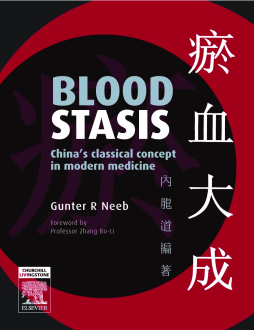
Additional Information
Book Details
Abstract
BLOOD STASIS: CHINA'S CLASSICAL CONCEPT IN MODERN MEDICINE covers the area of blood stasis in Traditional Chinese Medicine, drawing from a huge range of original Chinese material. The book discusses many Western diseases including diabetes, gynecological disorders, stroke, tumors, myocardial infarction, and the interaction of these with other pathological factors. The book also provides both classical and modern differentiations and treatments, including both herbs and acupuncture in all categories with appropriate case histories.
- Thoroughly examines the concepts and processes of blood stasis in Traditional Chinese Medicine.
- Draws on original translations from Chinese sources ranging from the classical era through modern times.
- Describes, in full, the historical perspective of Chinese Medicine's presentation of blood stasis theory and also includes modern research for a balanced view of the effectiveness of blood stasis.
- Highlights recent detailed analysis of blood stasis and herbs.
- Incorporates real-life cases helped by blood stasis therapy.
Table of Contents
| Section Title | Page | Action | Price |
|---|---|---|---|
| Front Cover | Cover | ||
| Blood Stasis: China's classical concept in modern medicine | iii | ||
| Copyright Page | iv | ||
| Contents | v | ||
| About the author | vii | ||
| Foreword | ix | ||
| Foreword from the German edition | xi | ||
| Preface | xiii | ||
| Dedication and acknowledgements | xix | ||
| Notes on translation style | xxi | ||
| Notes on terminology | xxv | ||
| Abbreviations used in the text | xxix | ||
| Section 1: Theory and background knowledge | 1 | ||
| Chapter 1 – Introduction: thought models in Chinese medicine | 3 | ||
| Chapter 2 – History and development of Blood stasis and its pathological mechanisms | 9 | ||
| Chapter 3 – Comprehension and diagnostics of blood stasis in conventional medicine | 13 | ||
| Chapter 4 – Aetiology of Blood stasis in Chinese medicine | 21 | ||
| Chapter 5 – Traditional diagnosis and syndrome differentiation of Blood stasis | 37 | ||
| Section 2: Practical application | 47 | ||
| Chapter 6 – Examples of treatment principles for Blood stasis | 49 | ||
| Chapter 7 – Blood stasis related medicinals, their application and combination | 53 | ||
| Part 1: Blood stasis related medicinals | 53 | ||
| Part 2: Tables and Boxes on Blood invigorating Chinese medicinals | 70 | ||
| Part 3: Pei yao: The most common combinations of Blood invigorating medicinals | 79 | ||
| Chapter 8 – Blood stasis in the practice of TCM – formulas and acupuncture | 97 | ||
| Chapter 9 – Practical cases: 20 further case studies from the ancient and modern practice of famous TCM physicians | 139 | ||
| Section 3: Classical texts | 169 | ||
| Chapter 10 – Wang Qing-Ren’s ‘Yi Lin Gai Cuo’ (Corrections of mistakes in the medical world) | 171 | ||
| Part 1: Wang’s anatomical studies | 173 | ||
| Part 2: Wang’s famous formulas and their indications | 192 | ||
| Part 3: Wang’s clinical studies and methodology | 202 | ||
| Chapter 11 – Excerpts relating to Blood stasis from six other classical texts (in chronological order) | 233 | ||
| APPENDICES | 247 | ||
| Appendix 1 – Glossary of essential TCM terms | 249 | ||
| Appendix 2 – Glossary of essential terms in haemorheology | 281 | ||
| Appendix 3 – List of Chinese medicinals with their Western pharmacological actions | 283 | ||
| Appendix 4 – Index of medicinals and formulas | 295 | ||
| Appendix 5 – List of formulas in this book, Chinese–English with quantities | 305 | ||
| Appendix 6 – Epilogue: Inspector White Coat | 319 | ||
| Appendix 7 – Bibliography | 323 | ||
| Appendix 8 – Eminent Chinese physicians and their works | 329 | ||
| Appendix 9 – Short bibliography of author’s publications (in chronological order) | 333 | ||
| Index | 337 | ||
| Color Plate Section | Color Plate-1 |
